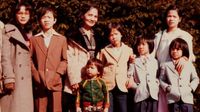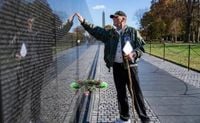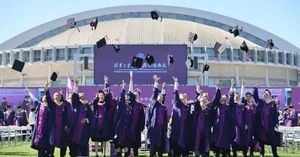Vietnam celebrated the 50th anniversary of the end of the war with the United States on April 30, 2025, marking a significant moment in the country’s history and its journey toward unity and peace. The fall of Saigon on this day in 1975 ended a long and divisive conflict that left deep scars on the nation, and the celebrations reflected a focus on reconciliation and a hopeful future.
In Ho Chi Minh City, thousands gathered for a military parade, a vibrant display of national pride that included troops, veterans, and local citizens. The event was attended by key figures, including To Lam, the general secretary of the Vietnam Communist Party, who emphasized the importance of unity among all Vietnamese people. “All the Vietnamese are the descendants of Vietnam. They have the rights to live and work, to have freedom to pursue happiness and love in this country,” Lam stated, highlighting the nation’s commitment to peace and development.
The parade featured a striking display of military formations, with Chinese, Laotian, and Cambodian troops marching alongside Vietnamese soldiers. Helicopters flew overhead, carrying the national flag, while jets performed aerial maneuvers above the Independence Palace, the site where a North Vietnamese tank famously broke through the gates on the last day of the war. Spectators waved flags and cheered, creating a festive atmosphere that echoed the sentiments of peace and unity.
As the celebrations unfolded, many attendees reflected on the significance of this anniversary. Nguyen Thi Hue, a resident of Ho Chi Minh City, expressed a common sentiment: “Now it’s time for peace. Peace is the dream that everyone in the world wants.” This emphasis on peace marked a shift from previous years when celebrations often focused on military victories.
Fifty years ago, the Vietnam War was a contentious conflict that divided not only the country but also the United States. Scholars and activists continue to debate the motivations behind American intervention and the legacy of the war. The U.S. military presence in Vietnam began after Ho Chi Minh established a communist government in Hanoi following the overthrow of French colonial rule in 1954. As tensions escalated, the U.S. sought to support an anti-communist government in South Vietnam, leading to a protracted conflict.
In the years following the war, many veterans returned home to a public that was often indifferent or hostile. Rick Foley, a Marine veteran who served from 1967 to 1970, recalled the difficult transition: “We fought two wars: one over there and one back here.” The backlash against veterans stemmed from growing anti-war sentiment and revelations of atrocities committed by U.S. forces, such as the My Lai massacre, where hundreds of unarmed Vietnamese civilians were killed.
Today, the legacy of the Vietnam War continues to influence American society and the lives of veterans. Many still grapple with post-traumatic stress disorder (PTSD), a condition that affects approximately 5% of the nearly 3 million Americans who served in Vietnam. The trauma of war has also had a profound impact on Vietnamese American communities, where the effects of inherited trauma persist across generations.
As Vietnam reflects on its past, it also looks to the future. This year marks the 30th anniversary of diplomatic ties between Vietnam and the U.S., a relationship that has evolved significantly. In 2023, Vietnam upgraded its status with the U.S. to that of a comprehensive strategic partner, a move that underscores the importance of cooperation in addressing shared challenges.
However, recent tensions have emerged, particularly in light of President Donald Trump’s administration imposing heavy tariffs and cutting foreign aid, which has affected war remediation efforts in Vietnam. The U.S. relationship with Vietnam has been complicated by these developments, particularly as the country seeks to balance its relations with an increasingly assertive China.
Despite these challenges, the spirit of reconciliation remains strong. Pham Ngoc Son, a veteran who fought for the communists, emphasized the need for peace and friendship between the U.S. and Vietnam, stating, “The war is over a long time ago.” This sentiment resonates with many who believe that healing and collaboration are essential for both nations moving forward.
The past five decades have seen Vietnam transform into one of Asia’s fastest-growing economies, yet the scars of war continue to shape its society. The emotional and psychological wounds inflicted by the Vietnam War are still felt, and many families carry the weight of their experiences in silence. The ongoing process of healing requires acknowledgment and understanding from all sides of the conflict.
As Vietnam commemorates this historic milestone, it is essential to remember the stories of those who lived through the war, both on the battlefield and at home. The narratives of veterans, refugees, and those who remained in Vietnam remind us of the complexities of the conflict and the importance of fostering a culture of peace and unity.
The celebrations in Ho Chi Minh City serve as a powerful reminder that the legacy of the Vietnam War is not just one of division, but also of resilience and hope. As the country moves forward, it is crucial to honor the sacrifices made and to work towards a future where peace prevails.





